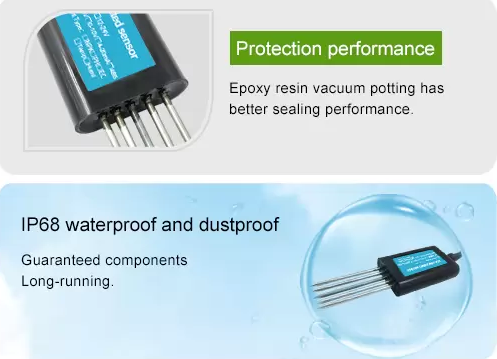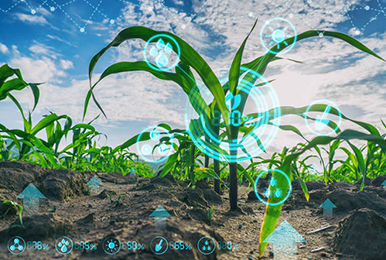Soil moisture meter, also known as soil moisture sensors or soil moisture probes, are essential tools used to measure the moisture content of soil. These devices play a crucial role in agriculture, horticulture, environmental monitoring, and research applications by providing valuable information about the water status of the soil. Soil moisture meters are designed to accurately measure the amount of water present in the soil, which is vital for optimizing irrigation practices, assessing plant health, and understanding the overall water balance in the soil-plant system.
Principles of Operation

Soil moisture meter operate based on various principles, including electrical resistance, capacitance, and dielectric properties of the soil. Each type of soil moisture meter utilizes a different method to measure soil moisture content, and the choice of technology depends on factors such as the specific application, soil type, and measurement accuracy requirements.
Electrical Resistance Soil Moisture Meters:
Electrical resistance soil moisture meters, also known as resistance-based or gypsum block sensors, measure soil moisture content by assessing the electrical resistance of the soil. These sensors typically consist of two electrodes embed in a porous material. As the soil moisture level changes, the electrical resistance between the electrodes also changes, allowing for the determination of soil moisture content.

Capacitance Soil Moisture Meters:
Capacitance soil moisture meters operate based on the principle of measuring the dielectric properties of the soil. These sensors typically consist of two electrodes that act as plates of a capacitor, with the soil serving as the dielectric material between the plates. By applying an alternating current (AC) to the electrodes, the sensor can measure the capacitance of the soil, which is directly related to the soil moisture content. Capacitance soil moisture meters are known for their high accuracy and ability to measure soil moisture at different depths.
Time Domain Reflectometry (TDR) Soil Moisture Meters:
TDR soil moisture meters utilize the principle of time domain reflectometry to measure soil moisture content. TDR sensors emit electromagnetic pulses into the soil and measure the time it takes for the pulses to be reflecte back. The travel time of the pulses is directly related to the dielectric constant of the soil, which in turn is related to the soil moisture content. TDR soil moisture meters are known for their accuracy, ability to measure soil moisture at various depths.
Applications of Soil Moisture Meters
Soil moisture meters find widespread applications in various fields, including agriculture, horticulture, environmental science, and research. Some of the key applications of soil moisture meters include:
Optimizing Irrigation Practices:
One of the primary applications of soil moisture meters is to optimize irrigation practices in agricultural and horticultural settings. By accurately measuring soil moisture content, farmers and growers can determine the optimal timing and amount of irrigation needed to maintain healthy plant growth while avoiding overwatering or underwatering.
Monitoring Plant Health:
Soil moisture meters monitor plant health by assessing the water availability in the root zone. By maintaining an optimal soil moisture level, plant stress due to water deficit and overall plant health.
Environmental Monitoring:
In environmental science and ecology, soil moisture meters monitor soil moisture levels in natural ecosystems, wetlands, and forested areas. This information is valuable for understanding the water dynamics of the ecosystem, assessing habitat suitability for plant and animal species, and studying the impacts of climate change on soil moisture patterns.
Advantages of Soil Moisture Meters
Soil moisture sensors offer several advantages that make them indispensable tools for soil and water management:

Precision and Accuracy:
Soil moisture meters provide precise and accurate measurements of soil moisture content, allowing for informed decision-making in irrigation management and agricultural practices. Accurate soil moisture data is essential for optimizing water use efficiency and avoiding water-related stress in plants.
Resource Efficiency:
By using soil moisture meters to guide irrigation decisions, farmers and growers can optimize water use, reduce water consumption, and minimize the environmental impact of excessive irrigation or water waste. This contributes to sustainable water management and resource conservation.
Time and Labor Savings:
Soil moisture meters enable efficient monitoring of soil moisture levels, reducing the need for manual soil sampling and visual inspection. This saves time and labor, especially in large agricultural or horticultural operations, by providing real-time data on soil moisture status.
Data-Driven Decision-Making:
The data obtained from soil moisture meters empowers users to make data-driven decisions regarding irrigation scheduling, crop management, and water conservation strategies. This leads to more efficient use of resources and improved crop productivity.
Conclusion
Soil moisture meters are indispensable tools for assessing the water status of soil in agricultural, horticultural, environmental, and research applications. By providing accurate and timely information about soil moisture content, these devices enable farmers, growers, researchers, and environmental scientists to make informed decisions regarding irrigation management, plant health, and water conservation. The use of soil moisture meters contributes to resource-efficient water management, improved crop productivity, and sustainable environmental practices. As the need for efficient water use and sustainable agriculture continues to grow, the importance of soil moisture meters in optimizing water management practices will remain paramount.
